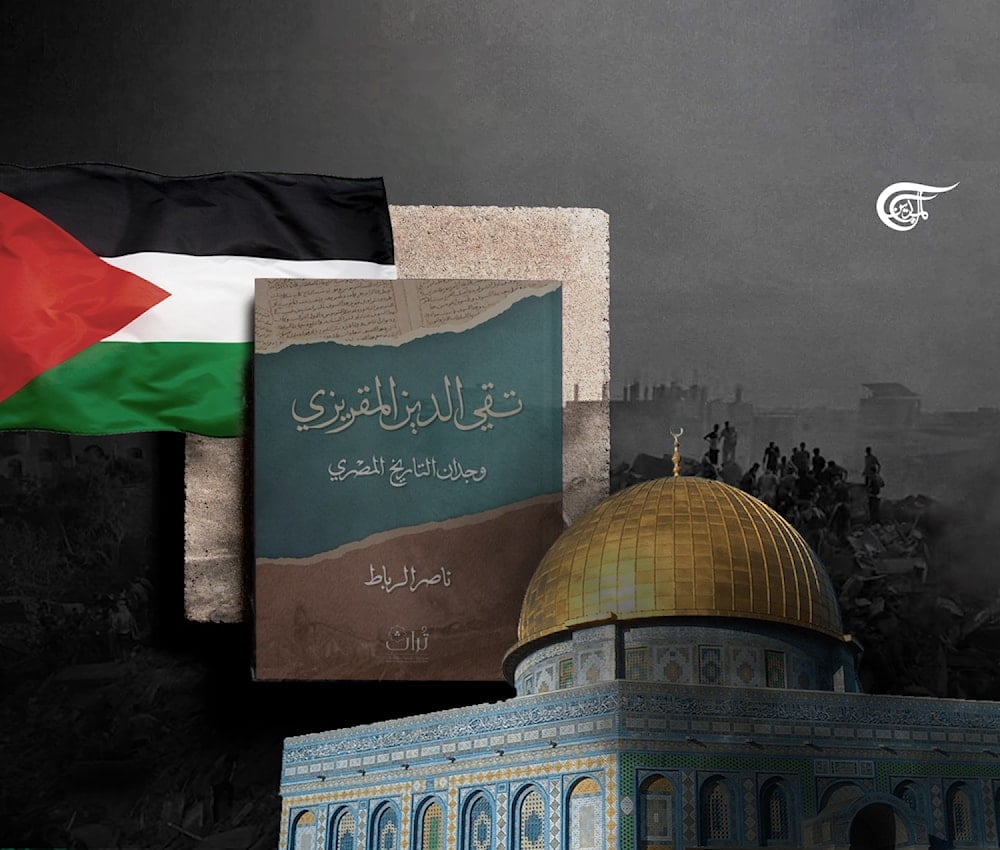Existential questions
My gratitude for this invaluable knowledge was mixed with a feeling of sorrow at the scarcity of such a book, which introduces our generation to the essence of pivotal historical milestones from which we draw inspiration.
-

Dr. Nasir Al-Rabbat’s book: “Taqi al-Deen al-Maqrizi: The Conscience of Egyptian History" offers a space of hope for review, thought, and insight into what is happening (Illustrated by Hady Dbouk; Al Mayadeen English)
When the war broke out in Ukraine between Russia and the West, Dr. John J. Mearsheimer said that Russia would prevail in it as it considers it an existential war, while the West does not, and it is actually not the case for it. I remembered this statement the day after Operation Al-Aqsa Flood, which was carried out by a people displaced under occupation and besieged by land, sea, and air. However, the Western reaction was as if it were an existential event for the West, as Western leaders rushed to “Israel” to express their support for it and their commitment to its security. US officials made shuttle visits to “Israel” and its friends in the region, and American battleships moved and channels of weapons and money were opened to an entity that was said to have the strongest army and the most modern weapons in the Middle East. “Israel” did not need all this support in an already unequal battle between an army that was equipped, financed, and trained and a few helpless Resistance fighters besieged in tunnels. Was this fear that the West expressed immediately and urgently evidence of a sense of existential danger to itself or to the entity that the West used to support and embrace and justify all its genocidal crimes? Or was it because of Western fear for its own centralism in both geography and history?
Recalling the alliances, organizations, and conferences for the countries of the East and South that preceded Al-Aqsa Flood, from the BRICS organization to Shanghai and the Group of 77, as well as all the narratives that accompanied these movements, stressing the necessity of reaching a multipolar world system, the ambition to exchange goods in local currencies and break the dollar’s monopoly on global trade, the technical progress that China has achieved in the last decade and the strengthening of relations between China, Russia, and Iran, and other indicators, we realize why the United States rushed to build new alliances and work to protect its old alliances, even if that required making some unprecedented concessions in the history of these relations.
I lived the tragedy of the war of genocide and ethnic cleansing in Gaza and Palestine and everything that followed October 7 at two levels: The first level: humanitarian and moral. The past nine months have been extremely difficult, and we have watched with infinite helplessness the extermination of thousands of children, mothers and doctors, media professionals, and rescuers and volunteers whose only "sin" in life is that they are Palestinians who were born on Palestinian land and happened to be in Palestine where a brutal, tyrannical Zionist machine, supported by the entire West, decided to slaughter them because it considered their existence a threat to its own existence. The second level is political, in which I felt that the imperialist West, led by the United States, was defending its leadership of the world and its hegemony over it; that it considered its prestige and international authority to be at stake, that the message it sought to convey to the world was a warning against any party standing up to it for any reason; and that whoever was with it was safe and victorious and whoever dares to contradict its doctrine and visions will face annihilation and destruction. From this brutal perspective, in my opinion, the movements of students, professors, and administrators in American, British, and German universities to support Palestine were dealt with, as no one, not even the citizens of “democracies", was allowed to show any challenge to this sacred model, which they claim to be “democracy and human rights," or even to doubt that it is the best system on earth.
Amid these puzzling human, national, and future problems, which I experienced deeply and honestly, I received Dr. Nasir Al-Rabbat’s book: “Taqi al-Deen al-Maqrizi: The Conscience of Egyptian History.” From its first pages, it provided me with a space of hope for review, thought, and insight into what is happening and its deep causes, in addition to glimpses of hope for creating a different future provided that there is will. The first thing that caught my attention in this book, and from the first pages of the introduction, is that it was written by an Arab researcher rooted in his land and history and proficient in the most important and latest approaches and methods of research and extrapolation that researchers in the West have reached. This constituted a significant difference in my mind and conscience from all the Orientalist students I had read for, who no matter how hard they worked to know what’s what, Orientalism remained an unconscious feature of their products.
Dr. Nasir Rabbat has breathed life into the biography of Taqi al-Deen al-Maqrizi from an intellectual and spiritual perspective using the latest world methods of documentation in a fine Arabic language that reiterates in its narrative the beauty of the language of the Quran, besides presenting in the best way possible the social, political and intellectual resources on which al-Maqrizi based his research or which were his influential temporaries or happened to quote from in his writings. Dr. Nasir Rabbat in his exceptional book breathed real life into all aspects of al-Maqrizi’s life and works. He did that through comprehensive, encyclopedic research in all what al-Maqrizi was or tried to be or shunned from being. Dr. Rabbat took his research and assessments of all the material under discussion so seriously and so attentively, armed with a brilliant mind and an extremely balanced judgment. I felt through reading this book as if I got to know everyone that al-Maqrizi had to deal with and everyone who studied him to the extent that I felt that he became my friend; a person I can discuss current-day affairs with and listen carefully to his input about our twenty-first century.
My gratitude for this invaluable knowledge was mixed with a feeling of sorrow at the scarcity of such a book, which introduces our generation to the essence of pivotal historical milestones from which we draw inspiration to resist any abusive mishandling of our current affairs. We also derive courage from both al-Maqrizi and Dr. Nasir Rabbat as beacons on the path of truth no matter how bad the time may be. Isn’t it remarkable that this comprehensive, profound, encyclopedic, and fair biography of a great historian who worked to immortalize the country that loved and resisted error and injustice with his wise style, patience, gentleness, and perseverance despite the darkest of days should become a help for me and people like me to live through difficult times six centuries after his death? Isn’t this creativity itself in balanced, sophisticated research and writing that combined the depth and comprehensiveness of the content with the latest scientific rules of writing a biography?
But this experience also raised disturbing questions for me: Is our problem, we Arabs, represented by the penetration of Western centralism into the folds of our history, including that of the Renaissance, and the saturation of the students of Orientalism with the thought of their teachers to the point that we are no longer able to formulate our intellectual history completely independently, as Dr. Nasir Rabbat did in this book? Does the Western political and military centralism that fuels the war of extermination against the Arabs under the eyes of the entire world constitute only one of the aspects of Western centralism that shaped our consciousness and conscience through Arab writers who impersonated Orientalism and were fascinated by it so that it became an unconscious component of their thought that they reproduced in various ways in literature that we called literature of enlightenment and renaissance? Are we, in the twenty-first century, still paying the price of the era of tyranny that burned the books of Ibn Rushd (Averroes), Ibn Sina, and Ibn Khaldun, so that the West took the lead in studying their writings, sometimes without mastering their Arabic language, and they returned to us with products that have an inferior view of our history, religion, and beliefs?
I used to wonder about the place of the Arabs in modern history, but now I wonder about the nature of Arab history and thought that we teach to generations, and whether we need to reconsider them away from Orientalism and rehabilitate Arab thought and identity on the foundations laid by the ancients before the Orientalists took it up and returned our goods to us laden with their incomplete and inferior view of us.

 Bouthaina Shaaban
Bouthaina Shaaban
 8 Min Read
8 Min Read











